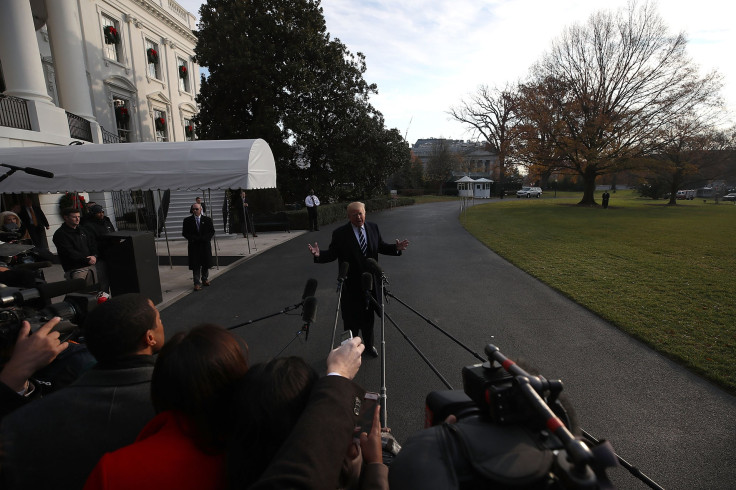Freedom Of Press Under President Trump Mocked By Uganda Communications Minister

Ugandan politician Frank Tumwebaze on Thursday mocked United States ambassador to the east African country, Deborah R. Malac, for saying the freedom of press in Uganda was under assault.
Tumwebaze, who is a member of parliament and the current cabinet minister of Information Technology and Communications, tweeted the freedom of press in Uganda was “not as worse as in ur own country where your President can't even tolerate questions from critical journalists at a press conference (sic).”
A tweet by Malac on Wednesday showed a picture of the ambassador at the Uganda Press Photo Awards Book Launch, an annual press photography award and a platform for Ugandan photojournalism. The photo’s caption said the event was an opportunity for the media community to come together in support of the freedom of press, which was being oppressed in the country.
Great time attending the Uganda Press Photo Awards Book Launch. Opportunity for the media community and supporters to come together to support #FreedomOfThePress, which is under assault in #Uganda. @UPPAward #UPPABookLaunch pic.twitter.com/xBLxfz3X2q
— U.S. Ambassador to Uganda (@USAmbUganda) December 6, 2017
Quoting her tweet, Tumwebaze told Malac to “put your own house in order first,” before she could help others. The comments seemed to be a clear dig at the freedom of press under the administration of President Donald Trump, which is perceived to be under threat due to his constant attacks on the media.
Not as worse as in ur own country where your President can't even tolerate questions from critical journalists at a press conference. Put your own house in order first and then try to help others https://t.co/uyZBQ4tMea
— Frank K Tumwebaze,MP : Psalms 124 : 1-8 (@FrankTumwebazek) December 7, 2017
Trump has, on numerous occasions, called multiple news organizations including CNN, New York Times and Washington Post “fake news” outlets and blasted them for reporting stories that criticized his administration’s actions.
Reporters Without Borders, an international non-profit, non-governmental organization that protects freedom of information and freedom of the press, released its 2017 Press Freedom Index in which the U.S. was ranked 43rd out of 180 countries with a score of 23.88.
The U.S. fell two ranks from 41 in 2016, and in its report the organization noted: “US press freedom, enshrined in the First Amendment to the 1787 constitution, has encountered several major obstacles over the past few years, most recently with the election of President Donald Trump. He has declared the press an ‘enemy of the American people’ in a series of verbal attacks toward journalists, while attempting to block White House access to multiple media outlets in retaliation for critical reporting.”
Meanwhile, Uganda was ranked further below on the list, at 112, after falling 10 positions down from 2016.
Reporters Without Borders said in its report on the country: “Acts of intimidation and violence against journalists are an almost daily occurrence in Uganda. The 2016 presidential election saw serious media freedom violations, including threats to close down media outlets, Internet cuts, and verbal and physical attacks on reporters, especially those covering the opposition leader. Since Yoweri Museveni became president in 1986, many journalists who do not toe the government line have been suspended, stripped of their equipment, or badly beaten by ruling party members or security agents.”
Recently, in May, at least six journalists were arrested in the country as they marched in the capital Kampala to commemorate World Press Freedom Day. They were subsequently released, with no charges filed.
The Uganda Human Rights Commission on the same day said in a statement: “The Uganda Human Rights Commission recognizes improvements in the operating environment for the media in Uganda since the adoption of the liberalization press policy in 1993.”
However, human rights organizations across the world condemned the current government and the country’s history of violence against journalists and media outlets.
© Copyright IBTimes 2024. All rights reserved.




















